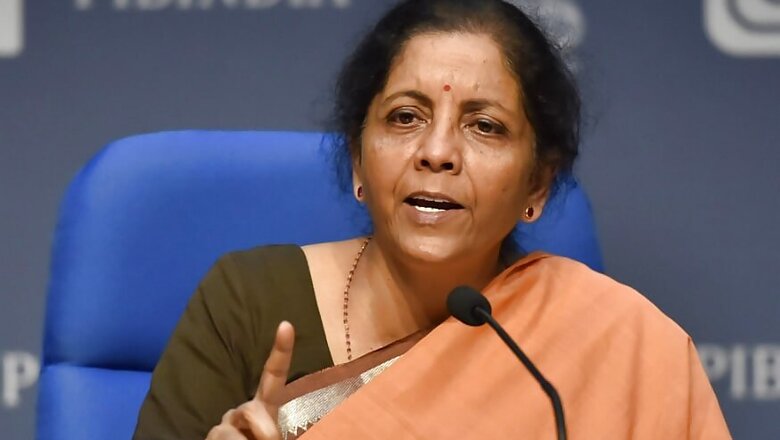
views
This would have been a tough call for any government at the best of times: to cut or not to cut interest rates on small savings instruments. But the government has been brave and announced anywhere between 70-140 basis point (0.7%-1.4%) reduction in interest rates for schemes such as the Public Provident Fund (PPF), Senior Citizens Savings Scheme and the National Savings Certificates.
The lower rates are applicable for three months, till June, as of now but this trend of lowering interest rates on key small savings schemes does not bring tidings to India’s elderly and those who largely depend on interest from their savings to manage their monthly expenses; specially in the current scenario, when income stability is in question across the board and inflation is widely expected to begin rising again.
Experts point to the necessity and the logic which the government has used in slashing interest rates. There was already considerable stress in the economy, even before the COVID-19 pandemic hit India and now, an already stretched growth curve of the Indian economy has virtually been flattened.
In order to maintain liquidity in the system, the RBI reduced the repo rate (rate at which it lends to banks) by a whopping 0.75% (75 basis points) last week. Banks are now expected to commensurately lower rates they charge for retail loans such a housing or vehicle purchase. Naturally, they cannot continue to pay interest to investors of small savings instruments at a rate which is significantly higher than the rate at which they offer retail loans. So the monetary logic of the reduction in small savings interest rates is sound.
But popular sentiment is obviously against such a move. Former finance minister P Chidambaram said:
While reducing the interest rate on PPF and small savings may be technically correct, it is absolutely the wrong time to do so.— P. Chidambaram (@PChidambaram_IN) April 1, 2020
“In times of acute distress and uncertainty about income, people depend on the interest income on their savings. Government must reconsider immediately and restore old rates until June 30.”
For the quarter beginning on April 1 (April-June), the government has announced a cut in the rate of interest of small savings instruments by anywhere between 70 to 140 basis points (0.7%-1.4%). Interest rates on public provident fund (PPF) are down 0.8% to 7.1%; your National Savings Certificates (NSCs) will now fetch only 6.8% from 7.9% earlier; Kisan Vikas Patras will get 6.9%. The interest rate for 5-year Senior Citizens Savings Scheme was slashed by a whopping 1.2% to 7.4%. The Sukanya Samriddhi Yojana will get 7.6% against 8.4% earlier; a five-year Recurring Deposit with a bank will now fetch 1.4% less at 5.8%.
The only relief is on interest on bank deposits which has remained unchanged at 4% a year.
Twitter user Kannan Gopinathan tweeted, “Senior citizen savings scheme reduced by 1.2%, NSCs by 1.1%. You couldn't have waited a bit longer to stab us with that knife you were sharpening all this while?”
Senior citizen savings scheme reduced by 1.2%, NSCs by 1.1%. You couldn't have waited a bit longer to stab us with that knife you were sharpening all this while? pic.twitter.com/l6lWEDWo0L— Kannan Gopinathan (@naukarshah) April 1, 2020
This could be a particularly bad time for the economically vulnerable largely dependent on interest income because other asset classes have become riskier for investments and also, given the economic crisis, inflation is now expected to raise its ugly head again.
DK Srivastava, Chief Policy Advisor at EY, also echoed these sentiments, saying that while the government’s move was meant to limit outgo of interest payments for three months, in line with the lower interest regime, “desirablity of such a move is much in doubt because the government is also trying to put in additional purchasing power in the hands of different sections of the economy (including senior citizens).”
He added that in these stressful times, options for senior citizens to park their savings in other instruments were limited and it was neither advisable for them to invest in mutual funds nor in sectors such as real estate.
The government’s latest action on small savings rate was expected, since top officials in the finance ministry had been hinting at a reduction for some time. The reduction will narrow the gap between bank deposit rates (4%) and the interest on small savings instruments.
Then, not only are senior citizens and the vulnerable upset at the government’s decision to slash rates, even those who are salaried or run businesses and have to pay EMIs on loans (auto, home) are frowning, despite the RBI announcing a three-month moratorium on all term loans. After the last monetary policy committee meeting, the RBI had allowed banks to offer a three month moratorium on EMIs.
But the fine print shows why this decision may not lead to all round cheer. First, the RBI has merely allowed banks to offer a moratorium and it is up to each bank to take a final call. Second, the fine print makes it clear that even if one avails of this moratorium, the interest component is not being waived so it is possible that the amount due after three months of non-payment of EMIs could be significantly higher than just the sum of the three EMIs. Also, the tenure of the loan gets increased by three months.
As COVID-19 wreaks havoc on the world economy and India tries to mitigate the impact, it is clear that all classes of citizens – the salaried, big and small businesses, women and senior citizens may have to face tough times.

















Comments
0 comment